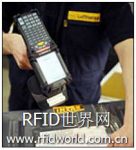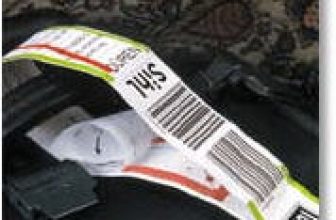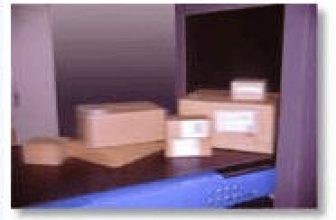
Lufthansa Maintenance Company adopts RFID to speed up the maintenance process of aircraft
[ad_1]
Lufthansa Technik, a global commercial aircraft maintenance, maintenance and repair service provider, and its subsidiary company Lufthansa Technik Logistik are now using RFID technology to track aircraft parts.
Lufthansa Technik sticks the passive EPC UHF tags to the written documents accompanying the aircraft parts. Once the RFID tags recognized by the aviation industry and meet its specifications appear on the market, the company hopes to label the parts directly.
Labels applied to aircraft components must meet a variety of safety requirements and meet high-tech standards, such as withstanding harsh weather, drastically changing temperatures, and various chemicals and liquids used in the aviation industry. The label must pass the flammability test and have electromagnetic compatibility. All RFID devices must be certified for use in explosive environments, and the tag size must be relatively small to be suitable for a variety of devices.
Lufthansa Technik (a subsidiary of Lufthansa Airlines in Germany) requires suppliers to provide passive UHF tags that meet the above requirements and the ISO 180006C standard. In parallel with the development of RFID-based ICs with ideal memory in the chip industry, the company is now cooperating with the International Aviation Association (ATA) to develop flexible data standards for tags.
ATA members include many giants in the aviation industry, such as aircraft manufacturers (Airbus, Boeing and Embraer), OEMs (Rockwell Collins, Thales), airlines and MRO service providers (American Airlines, Continental Airlines and Lufthansa Technik), RFID system integrators and development companies (SITA, Fujitsu, Intelleflex and Tego).
Michael Scheferhoff is the chairman of ATA’s RFID/AutoID working group. He is responsible for coordinating all RFID activities of Lufthansa Technik (including Lufthansa Technik Logistik).
He said that although many label suppliers are currently committed to developing labels that meet Lufthansa Technik’s technical requirements, none of them has successfully developed so far.
From now on, Lufthansa Technik puts a label on every document of aircraft parts, and the documents follow the process of disassembly, repair and reinstallation of the parts. In July, Lufthansa Technik and Lufthansa Technik Logistik completed a four-month RFID file application at the Hamburg headquarters and two third-party repair shops in Germany, during which they gained valuable experience in RFID applications. As the RFID application reduces or eliminates manual data input, which greatly speeds up the repair process of components, the company officially launched the application in all German factories in November.
By labeling documents, Lufthansa Technik’ employees no longer need to manually collect information about each part. Previously, workers manually recorded the steps that were performed and needed, and workers at the sorting station were not allowed to enter this information into the computer. Since this is a manual intensive process, it usually takes a few days to send a part to an appropriate repair shop.

Use the reader to read the labelled aircraft parts files
“Thanks to the RFID tag attached to the file, now we will no longer rely on vision to receive the disassembly information sent by the repairman,” Scheferhoff said. “Our future goal is to complete the process of unloading a part from the aircraft and sending it to the repair shop within 24 hours.”
Lufthansa Technik not only provides services for Lufthansa, it also provides services for other airlines, and it also stores a large number of spare parts. In order to fully implement RFID, the company will have to label these stocks. “This is estimated to take a long time because of the large number of parts and it is in a permanent cycle.”
The pilot project and RFID document tracking application used UPM Raflatac’s passive EPC UHF smart tags, which comply with the EPC Gen 2 air interface standard. The reader and antenna are provided by Motorola.
Once the permanent RFID tags are installed on the aircraft components, the mechanics will use portable RFID readers and computers to directly read the tags of each component on the aircraft, and then enter information about the steps that have been performed and the steps that need to be performed. Lufthansa Technik plans to label not only the tag ID number, but also the production record of the part, such as the serial number of the part and the name of the manufacturer.
In order to link with the projects mentioned above, Lufthansa Technik established an RFID project management team to coordinate Lufthansa Technik’s RFID activities. Project management supports various RFID projects and provides suggestions for technology, supplier selection and application processes to avoid different views on the prospects of RFID applications in the team. The management team also pays close attention to the development of RFID technology and provides the latest development to ATA members in a timely manner.
In the future, the Lufthansa Technik also plans to apply RFID to other areas, such as cabin management: RFID helps flight attendants to check the expiration dates of life jackets, seat belts, and oxygen generators. These tasks usually take a long time.
In addition, Lufthansa Technik also hopes to apply RFID to internal processes, such as dirt or other environments where barcodes are prone to problems.
[ad_2]





